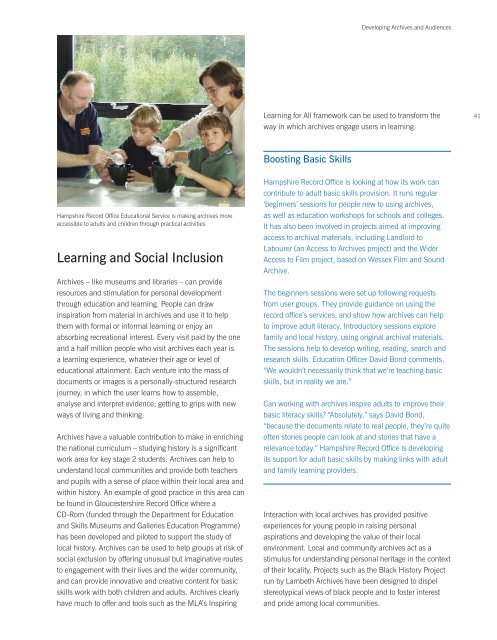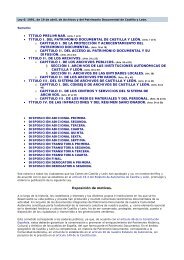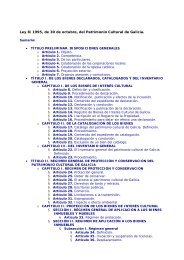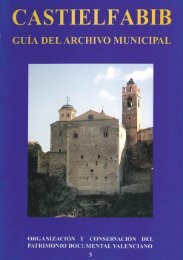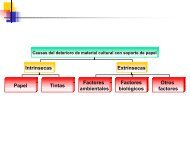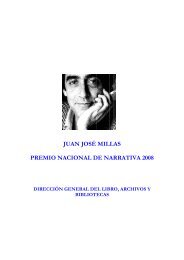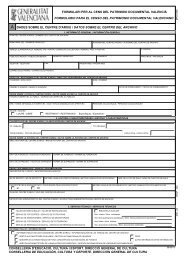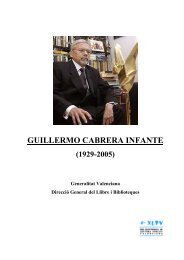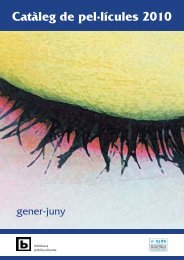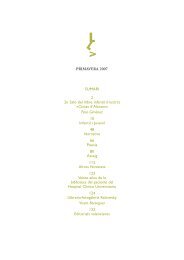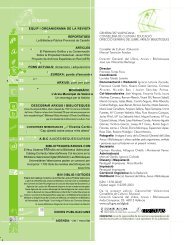Listening to the Past, Speaking to the Future
Listening to the Past, Speaking to the Future
Listening to the Past, Speaking to the Future
- No tags were found...
You also want an ePaper? Increase the reach of your titles
YUMPU automatically turns print PDFs into web optimized ePapers that Google loves.
Developing Archives and AudiencesLearning for All framework can be used <strong>to</strong> transform <strong>the</strong>way in which archives engage users in learning.41Boosting Basic SkillsHampshire Record Office Educational Service is making archives moreaccessible <strong>to</strong> adults and children through practical activitiesLearning and Social InclusionArchives – like museums and libraries – can provideresources and stimulation for personal developmentthrough education and learning. People can drawinspiration from material in archives and use it <strong>to</strong> help<strong>the</strong>m with formal or informal learning or enjoy anabsorbing recreational interest. Every visit paid by <strong>the</strong> oneand a half million people who visit archives each year isa learning experience, whatever <strong>the</strong>ir age or level ofeducational attainment. Each venture in<strong>to</strong> <strong>the</strong> mass ofdocuments or images is a personally-structured researchjourney, in which <strong>the</strong> user learns how <strong>to</strong> assemble,analyse and interpret evidence; getting <strong>to</strong> grips with newways of living and thinking.Archives have a valuable contribution <strong>to</strong> make in enriching<strong>the</strong> national curriculum – studying his<strong>to</strong>ry is a significantwork area for key stage 2 students. Archives can help <strong>to</strong>understand local communities and provide both teachersand pupils with a sense of place within <strong>the</strong>ir local area andwithin his<strong>to</strong>ry. An example of good practice in this area canbe found in Gloucestershire Record Office where aCD-Rom (funded through <strong>the</strong> Department for Educationand Skills Museums and Galleries Education Programme)has been developed and piloted <strong>to</strong> support <strong>the</strong> study oflocal his<strong>to</strong>ry. Archives can be used <strong>to</strong> help groups at risk ofsocial exclusion by offering unusual but imaginative routes<strong>to</strong> engagement with <strong>the</strong>ir lives and <strong>the</strong> wider community,and can provide innovative and creative content for basicskills work with both children and adults. Archives clearlyhave much <strong>to</strong> offer and <strong>to</strong>ols such as <strong>the</strong> MLA’s InspiringHampshire Record Office is looking at how its work cancontribute <strong>to</strong> adult basic skills provision. It runs regular‘beginners’ sessions for people new <strong>to</strong> using archives,as well as education workshops for schools and colleges.It has also been involved in projects aimed at improvingaccess <strong>to</strong> archival materials, including Landlord <strong>to</strong>Labourer (an Access <strong>to</strong> Archives project) and <strong>the</strong> WiderAccess <strong>to</strong> Film project, based on Wessex Film and SoundArchive.The beginners sessions were set up following requestsfrom user groups. They provide guidance on using <strong>the</strong>record office’s services, and show how archives can help<strong>to</strong> improve adult literacy. Introduc<strong>to</strong>ry sessions explorefamily and local his<strong>to</strong>ry, using original archival materials.The sessions help <strong>to</strong> develop writing, reading, search andresearch skills. Education Officer David Bond comments,“We wouldn’t necessarily think that we’re teaching basicskills, but in reality we are.”Can working with archives inspire adults <strong>to</strong> improve <strong>the</strong>irbasic literacy skills? “Absolutely,” says David Bond,“because <strong>the</strong> documents relate <strong>to</strong> real people, <strong>the</strong>y’re quiteoften s<strong>to</strong>ries people can look at and s<strong>to</strong>ries that have arelevance <strong>to</strong>day.” Hampshire Record Office is developingits support for adult basic skills by making links with adultand family learning providers.Interaction with local archives has provided positiveexperiences for young people in raising personalaspirations and developing <strong>the</strong> value of <strong>the</strong>ir localenvironment. Local and community archives act as astimulus for understanding personal heritage in <strong>the</strong> contex<strong>to</strong>f <strong>the</strong>ir locality. Projects such as <strong>the</strong> Black His<strong>to</strong>ry Projectrun by Lambeth Archives have been designed <strong>to</strong> dispelstereotypical views of black people and <strong>to</strong> foster interestand pride among local communities.


